It’s always interesting to me how you can have pre-conceived notions of how a vehicle will behave based on collective wisdom and stereotypes. Like in other aspects of life, sometimes that can be a mental “shortcut,” and sometimes they can result in limiting one’s expectations more than is useful.
G’day again, Autopians! I know it has been some time since my last article here on this great site; life has been full-on with work, life and the things that fill in the spaces between. I’ve been gathering parts for my Chrysler Regal SE build which I will update on hopefully soon, but today we will talk about another Japanese ute which is in the family.
My partner of nearly fourteen years, Bek, is the cute torsion-bar expert from the articles and videos when we built Project Cactus (and is undeniably patient and understanding for hosting DT over a month!), having been there to help me install four Aussie Valiant front suspensions now, with another couple coming on the horizon.
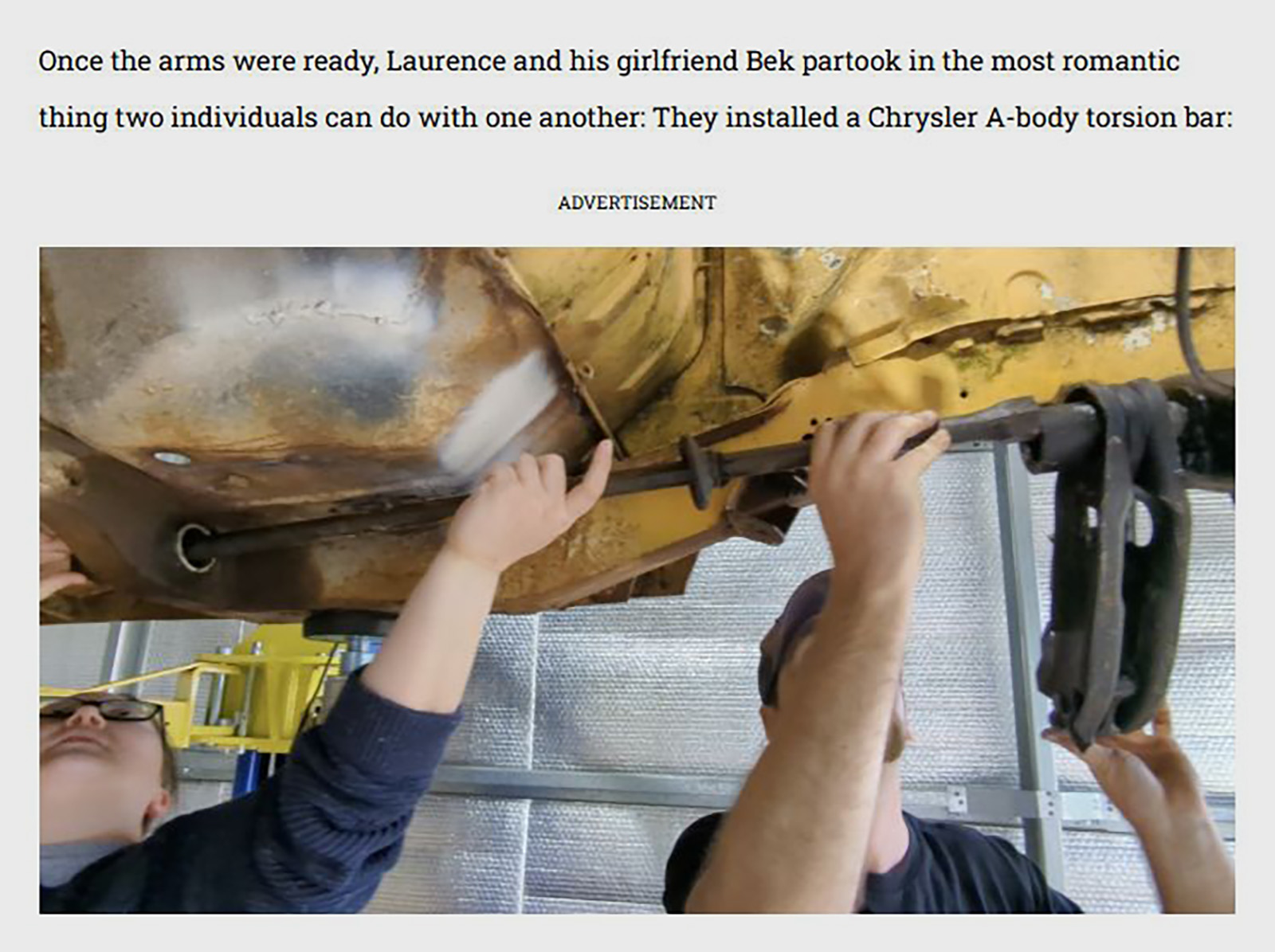
Bek has a love of all things Japanese and has a reasonable level of conversational skill in the car-language. When we started looking for a classic for her to enjoy, she immediately decided on something small, light and Japanese. Naturally, she settled on a vehicle with one of the greatest names in all of Autopia; the Suzuki Mighty Boy.
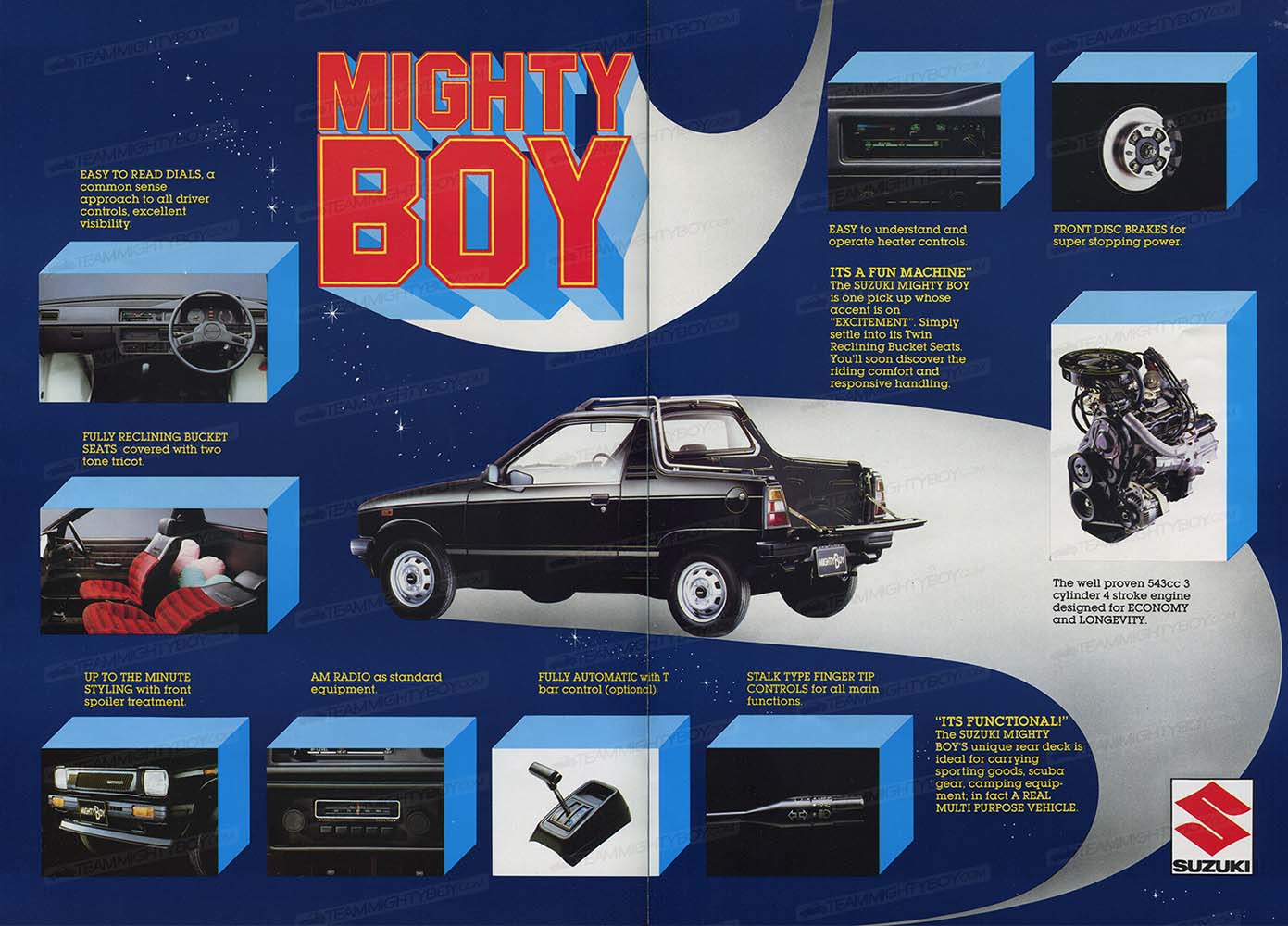
Made from cutting down the back of the 1982 SS40C Suzuki Cervo into a ute, the Mighty Boy was released to the Japanese market the following year. Built under the kei-jidōsha rules in effect from 1976-1990, they had a carbureted 543cc Suzuki F5A inline-three cylinder engine powering the front wheels with all of 26.5hp/19.8kw.
Australia and Cyprus were the only export markets, with the overseas shipments starting in 1985 when minor revisions were made, including an increase in power to 30hp/22.7kw!
30 horsepower!
Back then they were one of the cheapest vehicles you could buy in Australia from ’85 until production ended in ’88, at a starting price of just AUD $5,495 in 1985 they were well under half the price of a base-model VK Commodore. The Aussie version was so basic it only had a four-speed manual (optional two-speed auto!), ultra-basic gauge cluster and an AM-only radio as standard.
Likely the smallest traditional ute (car-based pickup) ever made, the tray is still good for a couple small rectangular hay bales or maybe a half-dozen cartons of beer!
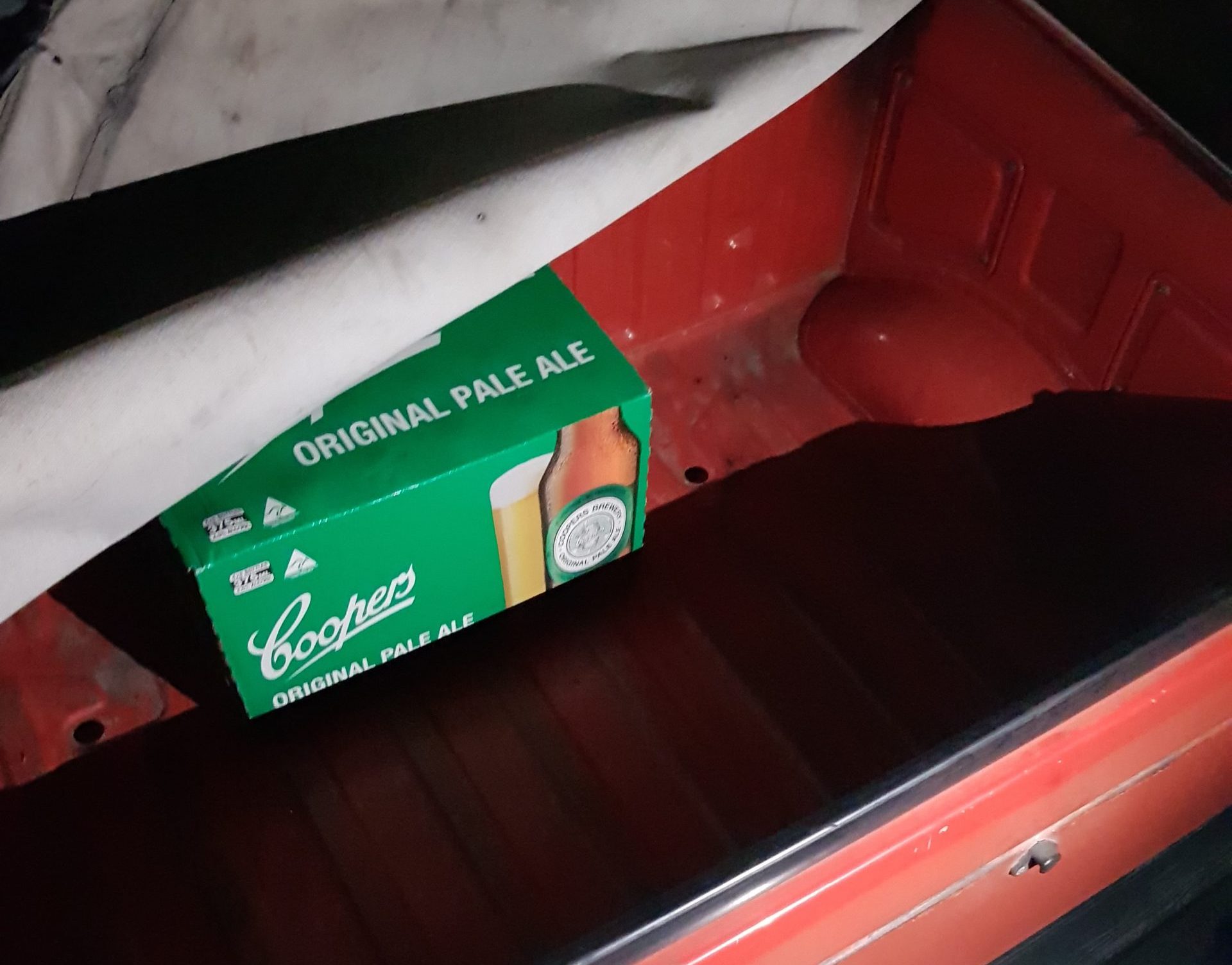
Game Boy
During a trip to Sydney, Bek found a Mighty Boy for sale a few hours north by the coast. We took it for a test drive, it was rough but seemed to run okay and Bek’s inimitable negotiation tactic of stone cold silence for a solid ten minutes when the subject of money came up netted her a good 25% discount!
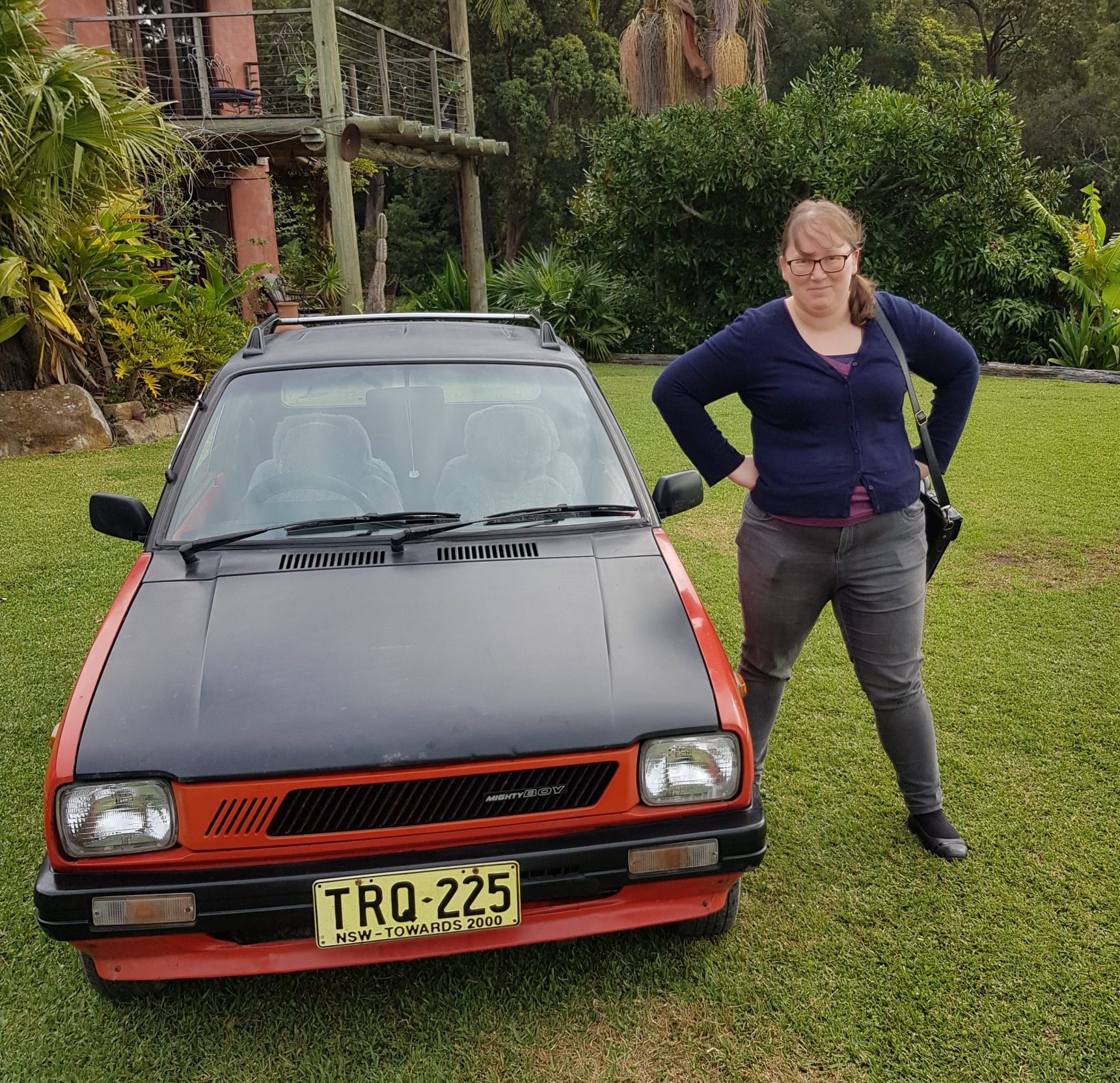
We had the cute-ute transported back home the following week. Living in Dubbo at the time, the diminutive size made it fun for carving up the city streets and it was keeping up with town traffic just fine. It was very smokey with the manual choke all the way on, but didn’t seem to be burning up its small 2.5 litre oil capacity at any alarming rate.
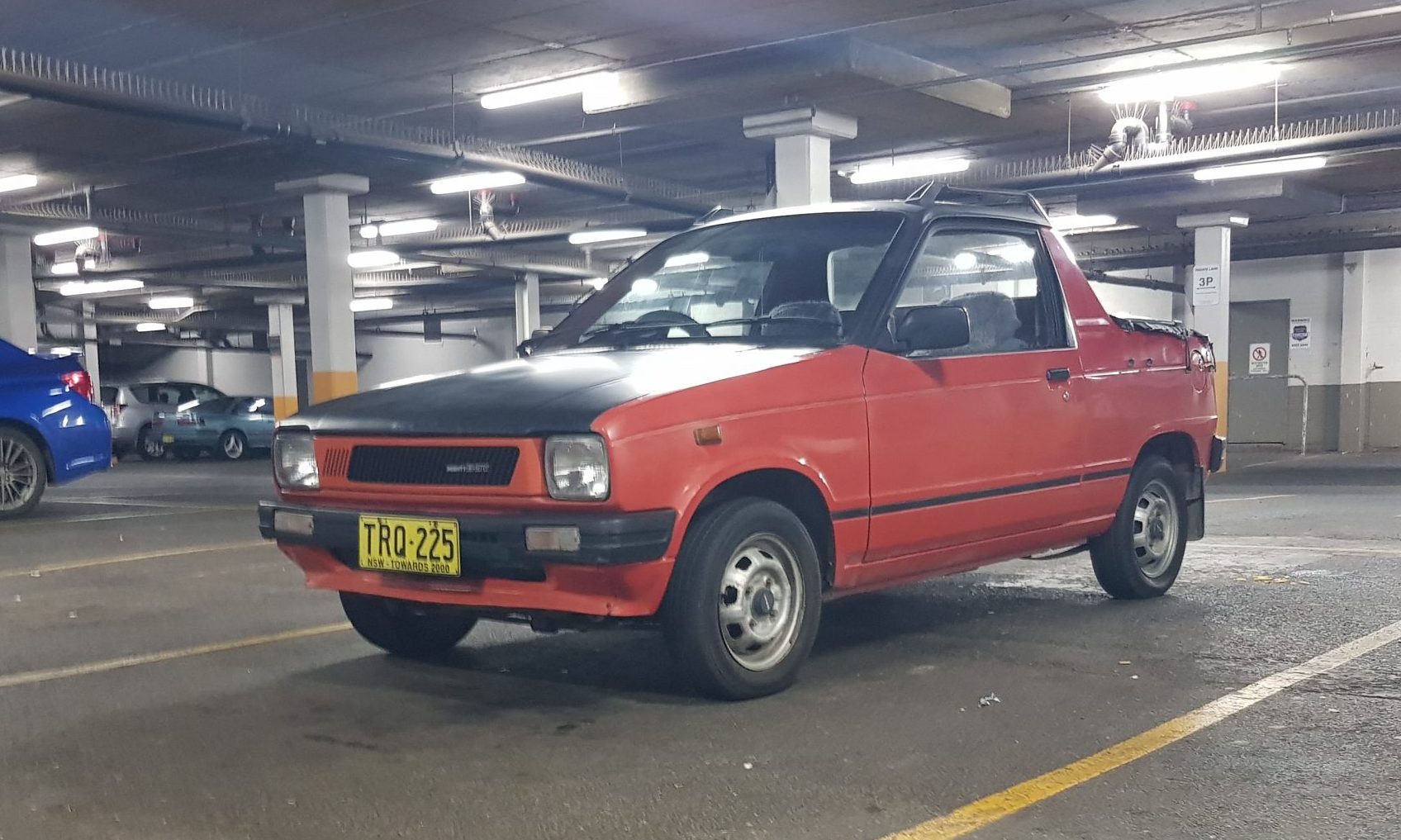
Being a Japanese econobox from the 80s, it had quite a bit of rust. I had some of the rust repaired for one of Bek’s birthdays, which is how we met absolute legends Callum and Henry of IronKnuckles. They remain great friends and have been invaluable in getting many of our other project cars sorted out, not just Project Cactus.
White Mighty Boy
By chance, a few months later there was a farm clearing-sale and on the listing there was a Mighty Boy. It was in rough shape, but Bek registered to bid as it was a complete vehicle. Luckily no serious bidding-war happened to break out over this lot, and the white ‘Boy was purchased for a three-figure sum.
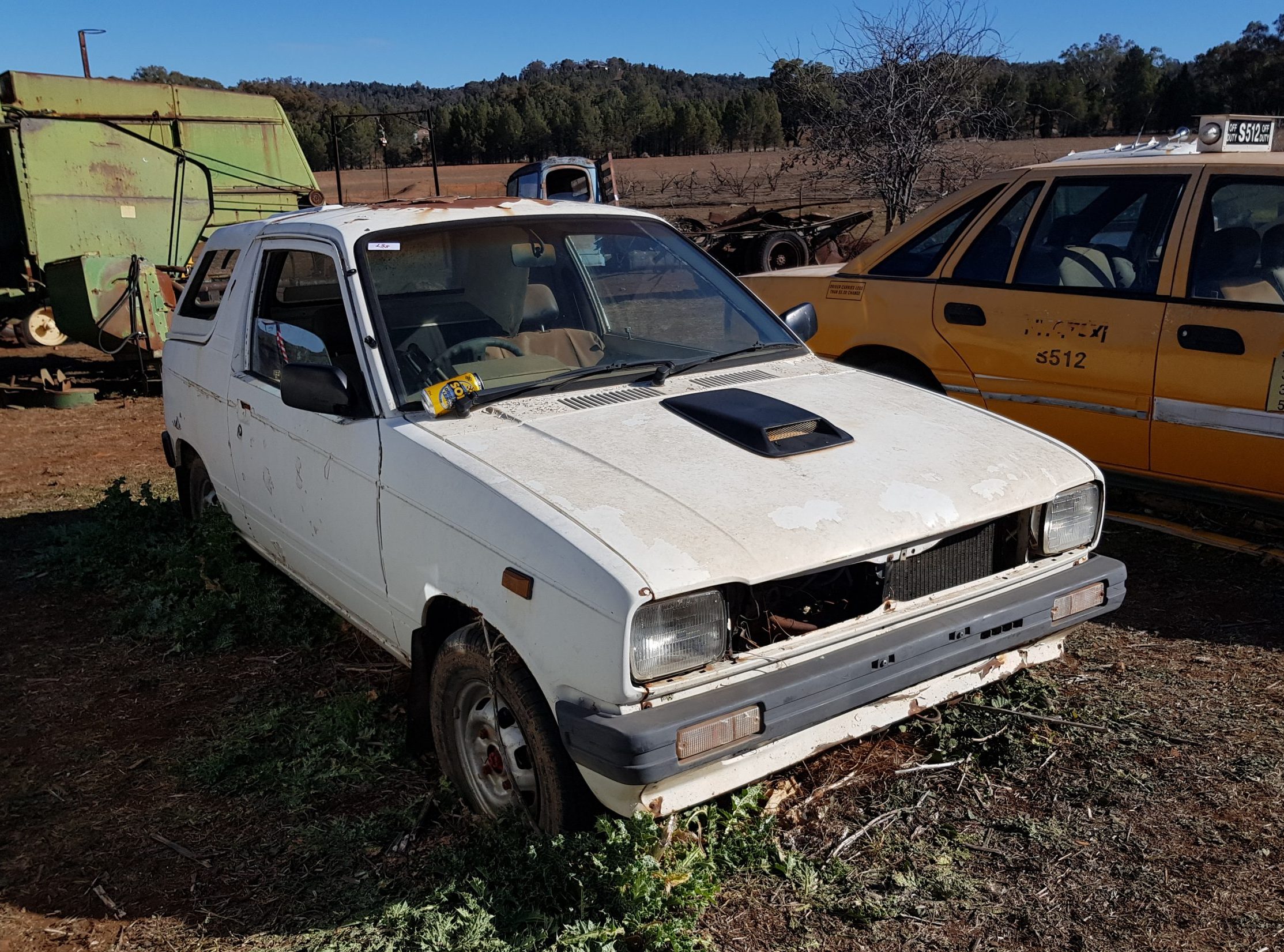
With a solid layer of far-west NSW red dirt and a collapsed Ramflo foam airfilter, we assumed the motor was likely trashed but the body seemed solid overall and had some pieces that the red ute was missing.
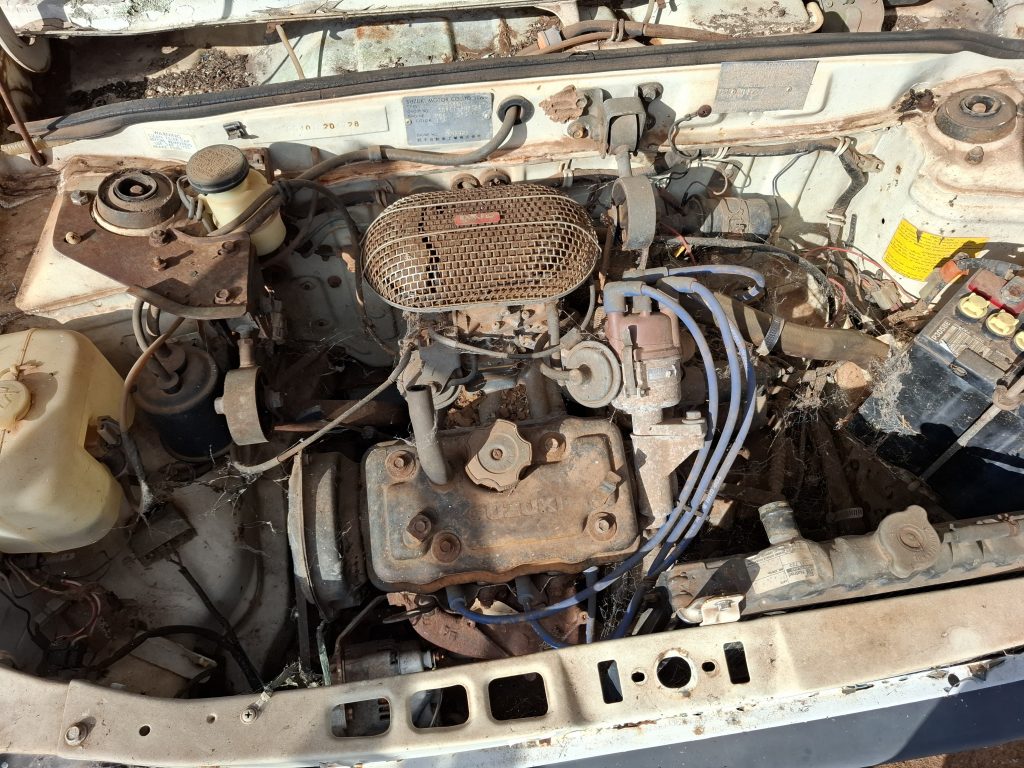
Fast forward a few years and we moved out of Dubbo to the small village we call home. For all the perks of village life (space, quiet, legendary hot rod builder around the corner), it became glaringly apparent that the ‘Boy was not up to the task of a highway commute into town. Flat-out getting to 80km/h (50mph) on level ground and rapidly losing that speed on inclines meant the little lad was banished to the backroads into town. Talking with others familiar with these vehicles said that was the best they got out of them too.
With the NSW Historic Registration Scheme you can drive for up to 60 days outside of club runs, which have to be recorded in a logbook kept in the vehicle.
The extra time, hassle and awful secondary roads on this route meant that Bek drove the Boy less and less. The logbook was lucky to have more than a handful of entries, such was the inconvenience of such a slow chap that couldn’t keep up with highway traffic.
We looked high and low for an F8B 800cc engine that was in the Suzuki Hatch of the same era, but they all seem to be either taken already or worn out past usefulness. I did manage to snag a 660cc F6A from a Suzuki Cappucino, but this came to us fully disassembled and needing a rebuild as well.
Broken Boy
Moving on to May this year, the stars aligned and Bek was able to make it to Dubbo Cars and Coffee for the first time in a while. After finally getting a photo with friends Adam and David who also own small, red cars it was time to head back for lunch at the local pub with some of the local car club members:
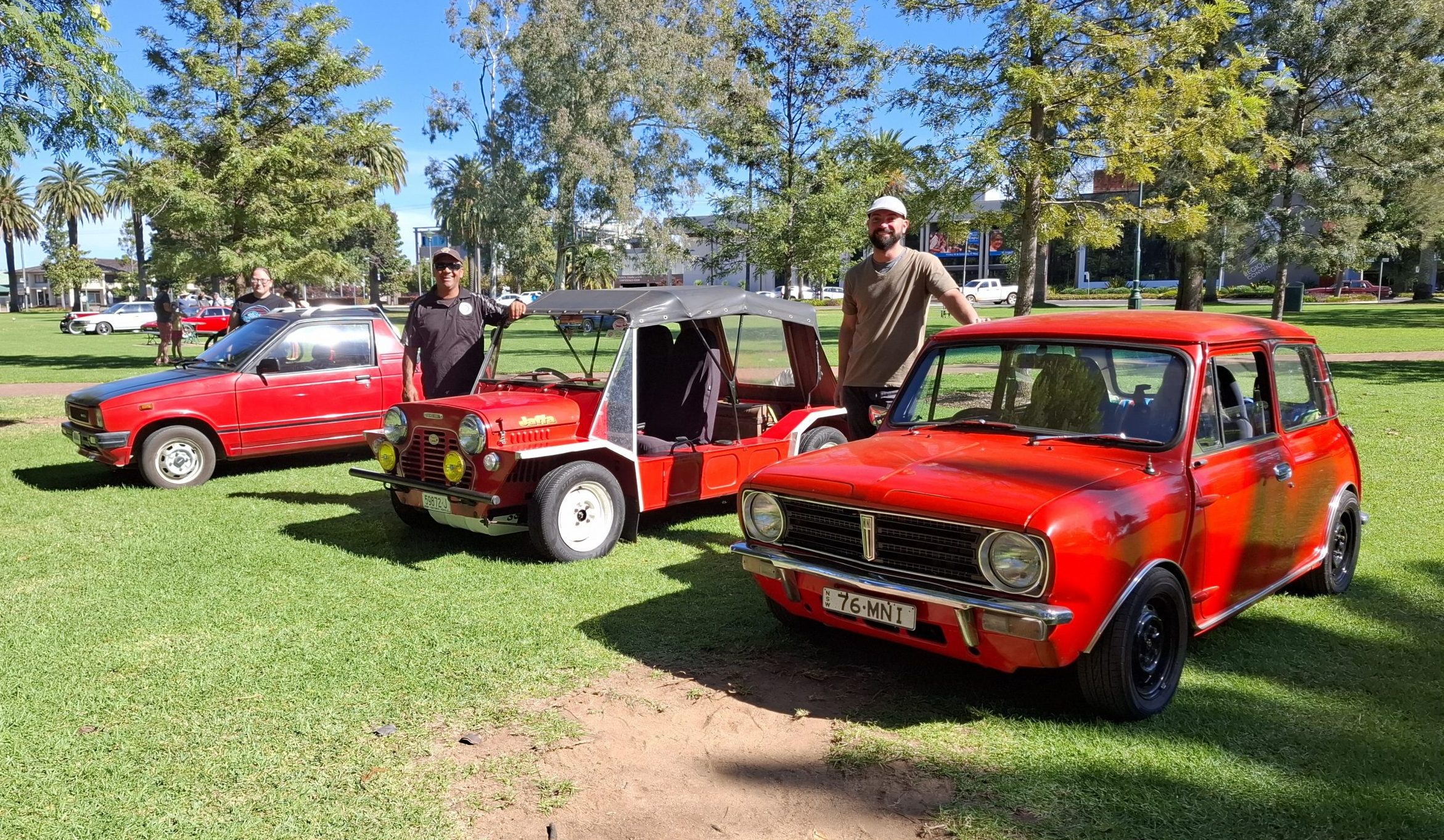
Having taken my Charger, I of course went via the highway and sat at an easy 70mph the whole journey. Waiting for Bek to arrive, after some time I received a call from her, stating that the little red lad had failed to proceed not far from home following a loud mechanical racket.
Hopping into my mate Adam’s Moke, we went off and grabbed a ratchet strap from my garage for the recovery mission.
Arriving at the scene, we tried starting the little load-hauler and discovered that it seemed to be running on only two cylinders. The loss of a full Otto-cycle in the other cylinder seemed to be such a big deal that it prevented forward motion even on level ground at this point. We attached the strap to the recovery point and to the Moke’s pipe-built rear bumper and had the little ‘Zook back in the garage in no time and returned to the pub for some lunch and theories as to what had happened.
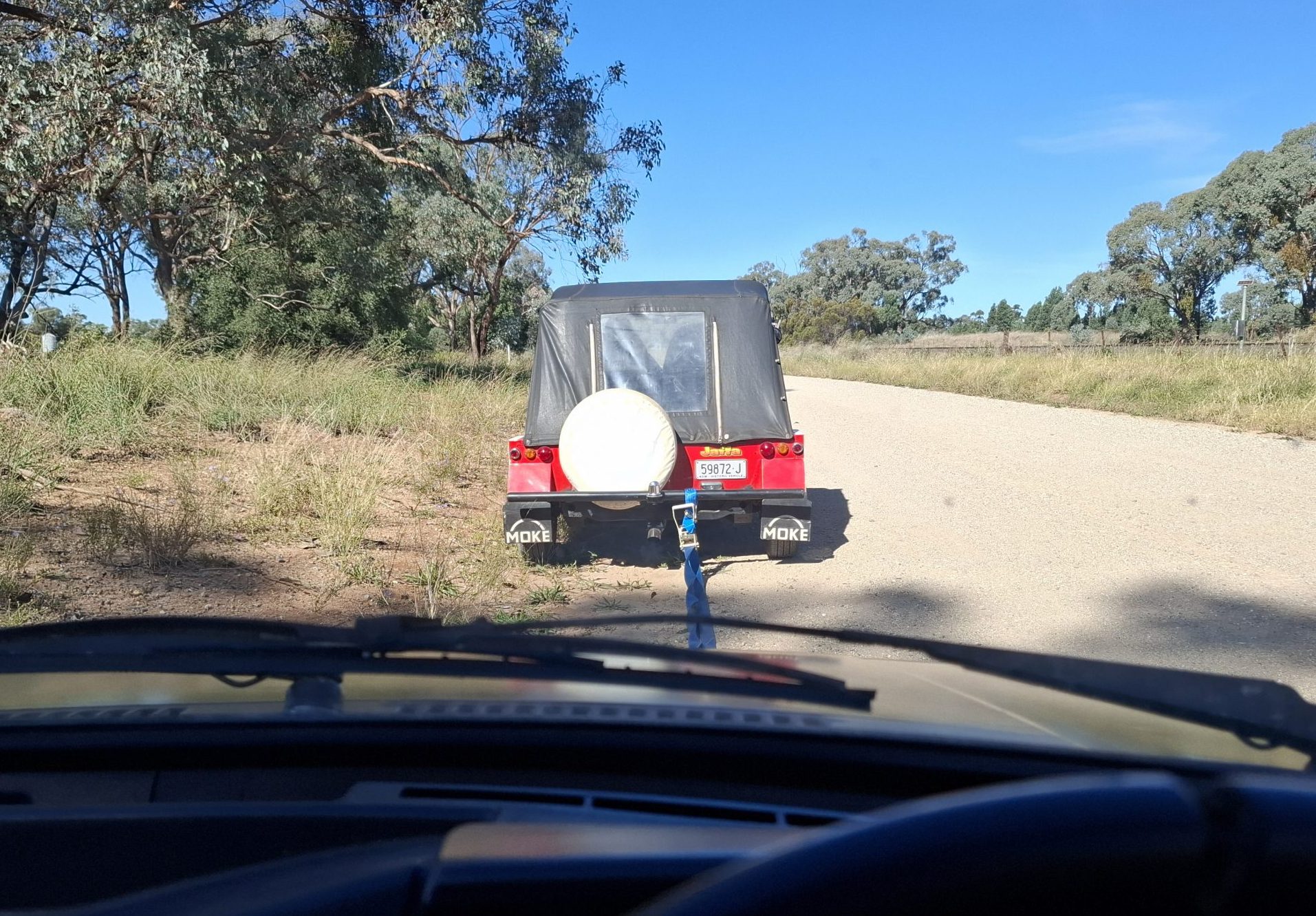
The following weekend I whipped off the valve cover and was met with a broken exhaust rocker for Number One cylinder, and some extreme wear on the camshaft and other rockers:
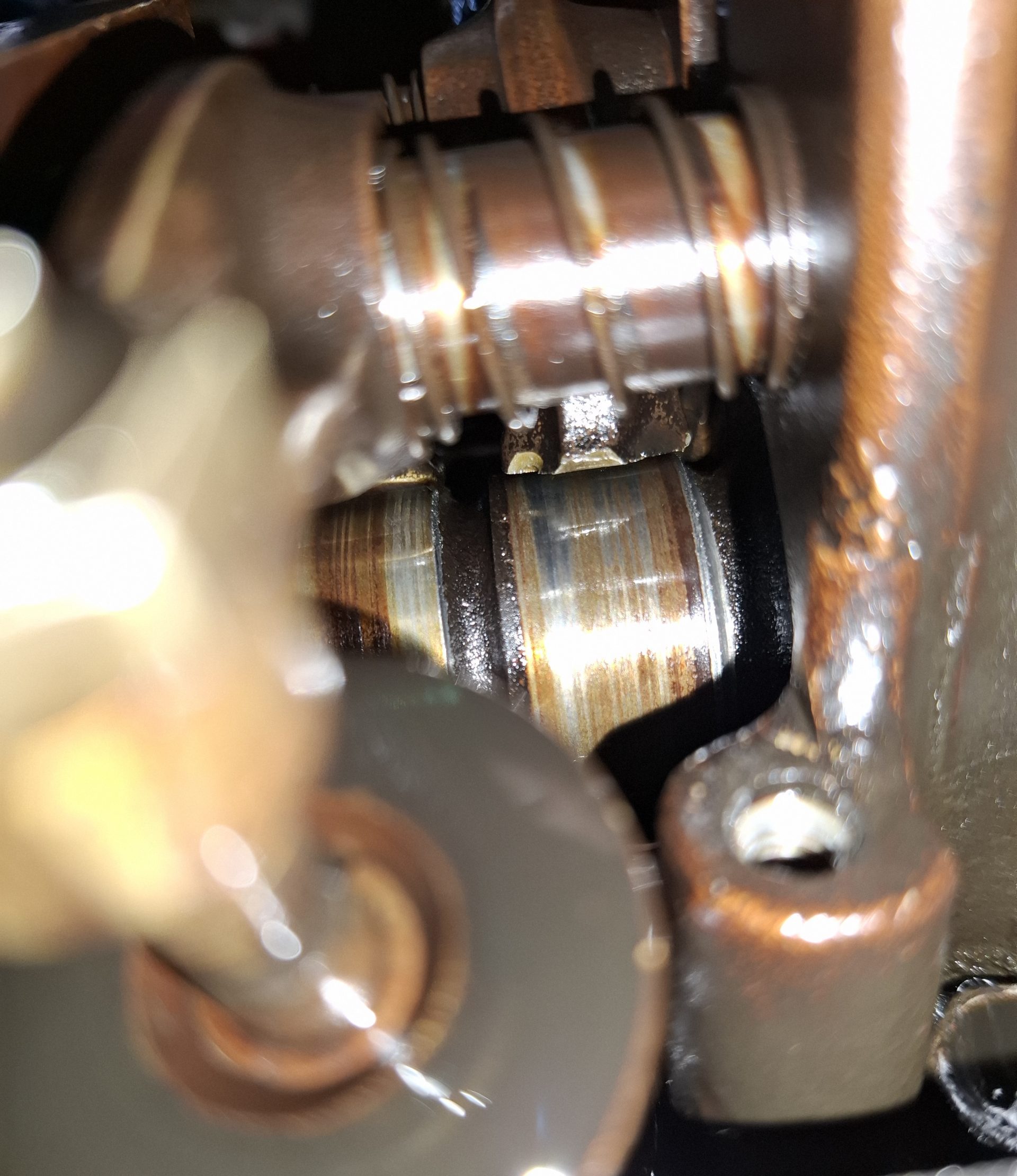
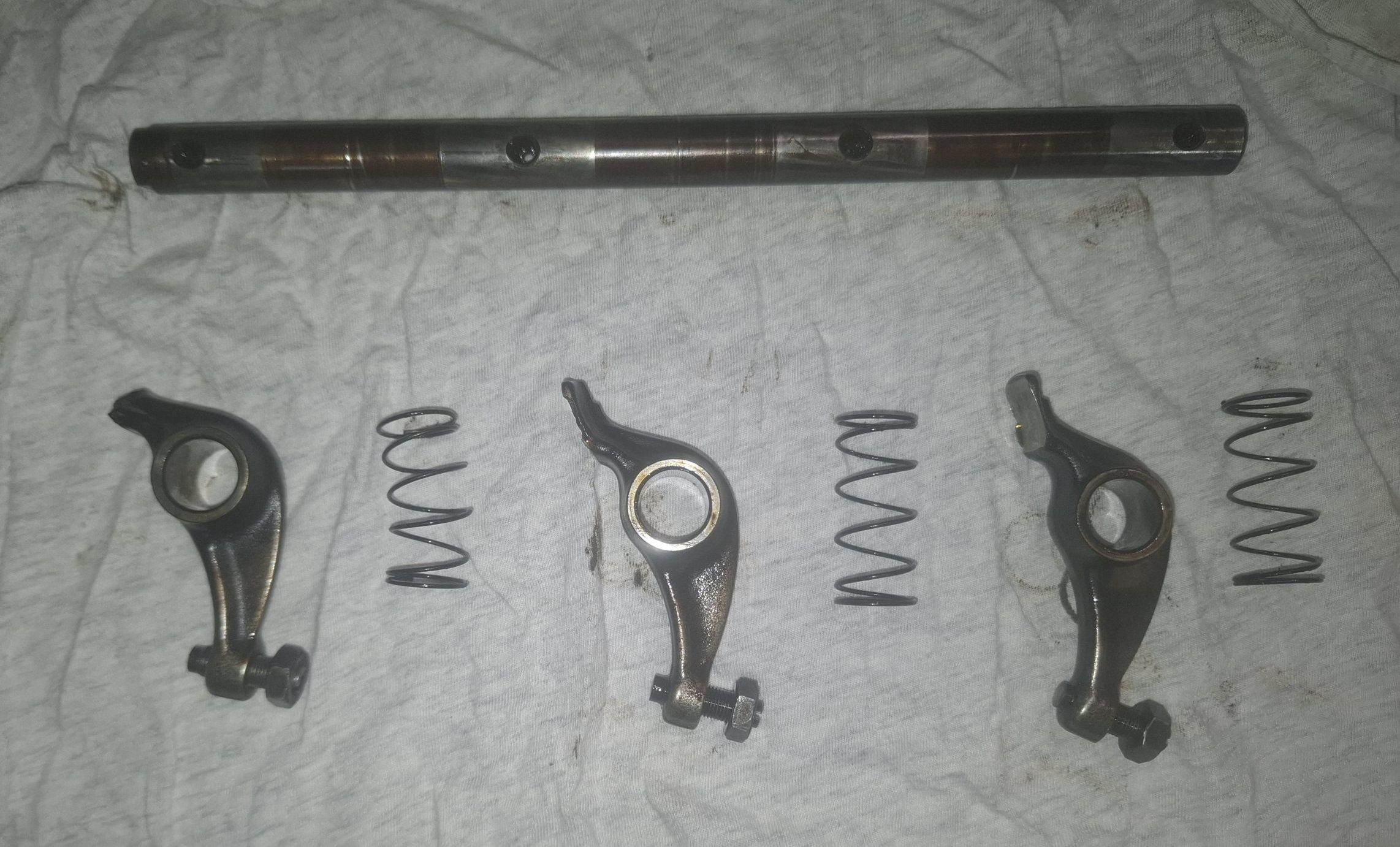
Storm Boy
With such wear on the cam, clearly the previous owners either ran the car low on oil or neglected to change oil with any frequency. Being the cheapest car on the market doesn’t exactly lend itself to very fastidious custodians. With several millimeters of wear on the cam, it is a surprise that the valves really opened at all!
Thinking back to the farm-auction parts-ute, I went out to the property and checked over the engine. The valvetrain looked great in comparison to the horror show in my garage, so I set about removing the head as one piece as it made more sense than disassembling it and pulling out the cam and rockers in-situ.
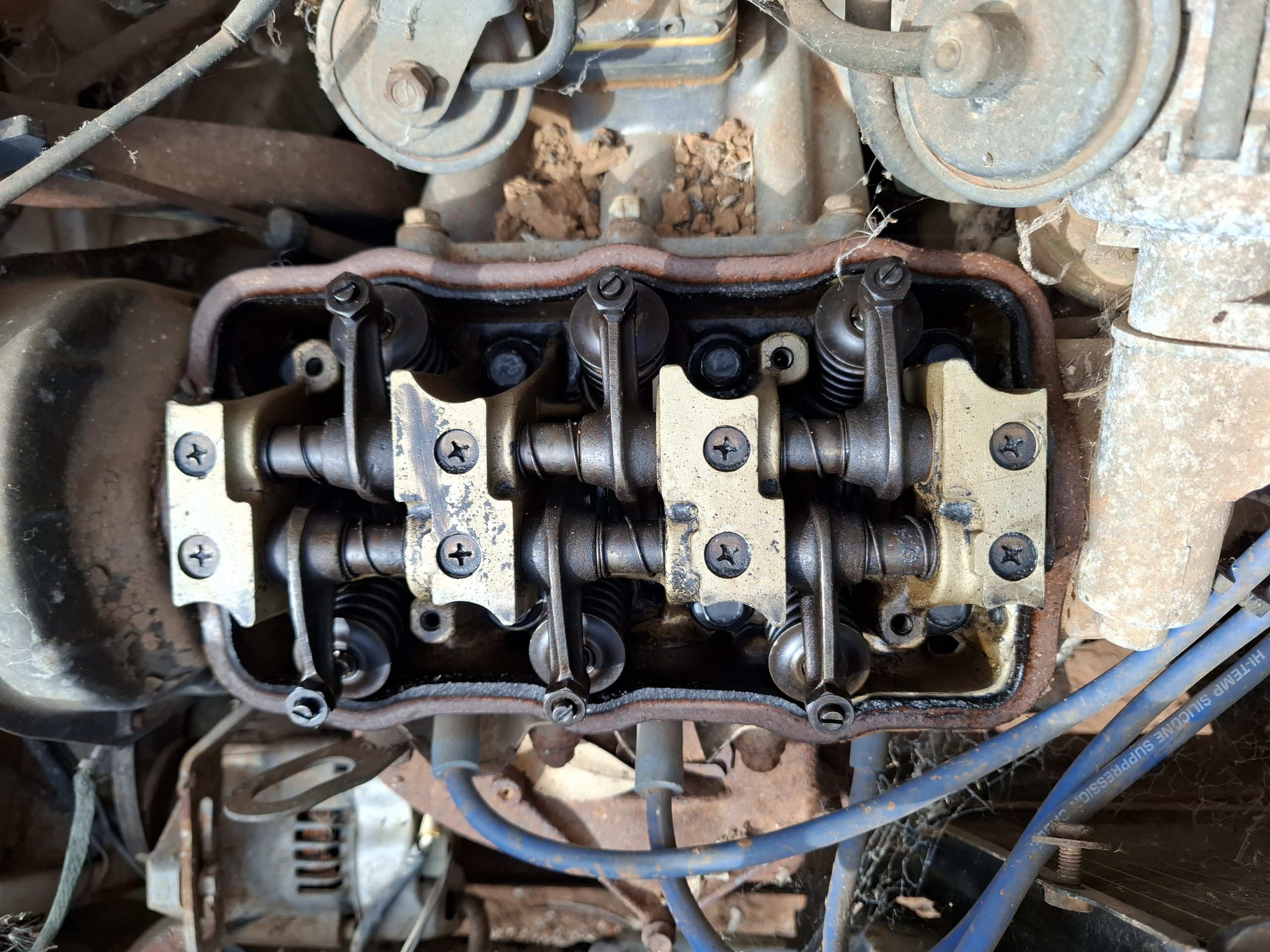
This was easier said than done, as the lower crank pulley had rust-welded itself to the crankshaft and said pulley was barely inches from the diminutive frame rail! I tried a generous dosing of lubricant, heat where I could reach and also not set a fire as well as some percussion whilst trying not to shatter the cast-iron pulley but it refused to budge.
With a bit of hackery, I had the cylinder head off and left the crank pulley and crank timing belt sprocket in place. Surprisingly, the cylinder walls looked okay and there wasn’t a giant lip on the top of the bore. Damnit, maybe I should have tried to fire it up!
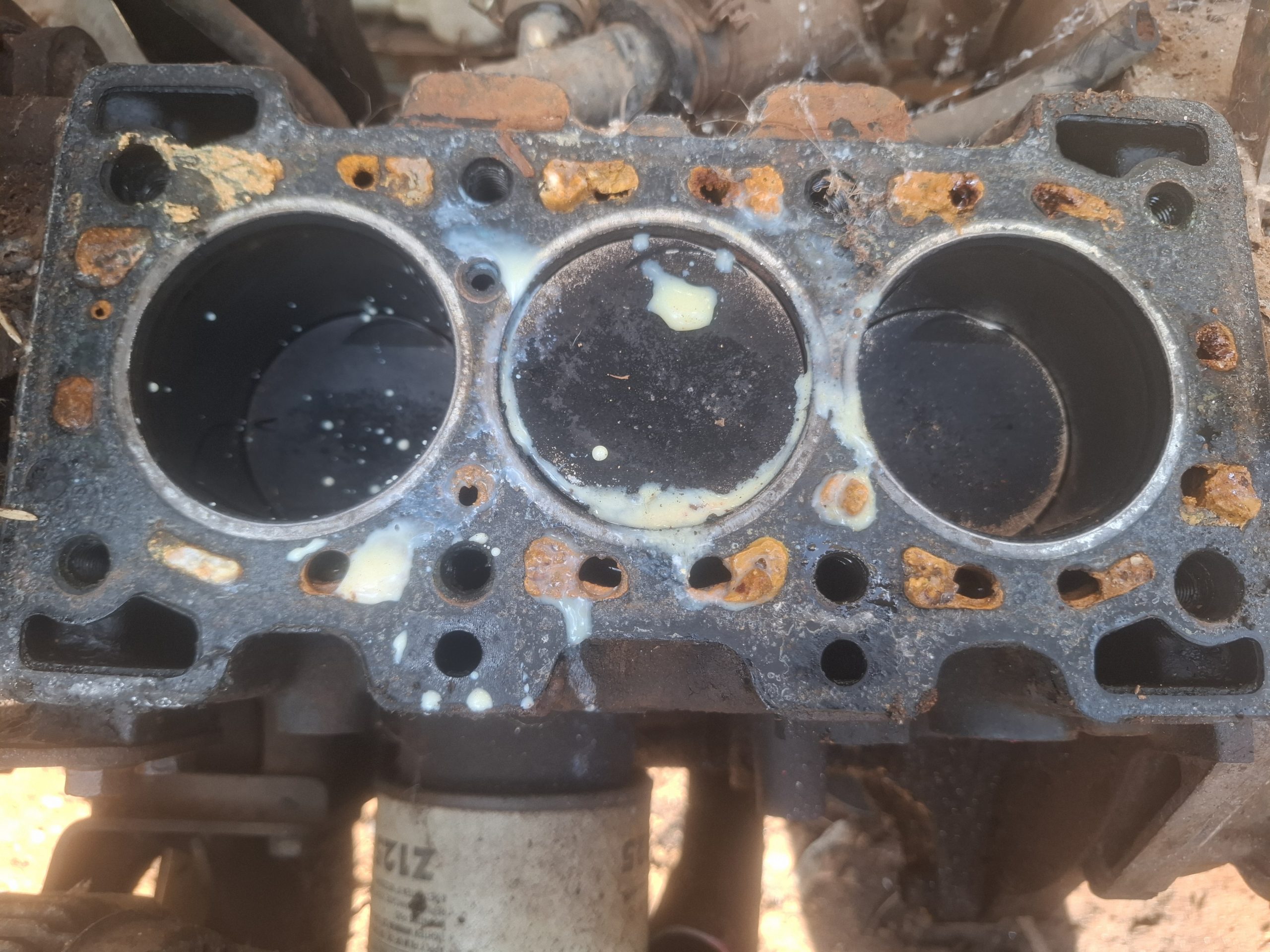
Returning home, I discovered that for some reason Suzuki saw fit to have two different timing belt and sprocket types that do not interchange for the camshafts! This meant I would have to get that crank sprocket to match the camshaft on the part-ute.
I went back out and had my full complement of pullers, as well as a plan to lift the front of the car with an engine crane and lower the front subframe with suspension to try and get either the pulley or put the whole lot in the back of Cactus and figure it out at home.
We decided to try one more thing before going nuclear: a bit of leverage. This had been tried with big screwdrivers, but there was a nice crowbar in the shed at the property which I grabbed and with some finesse the pulley finally broke free of the rust!
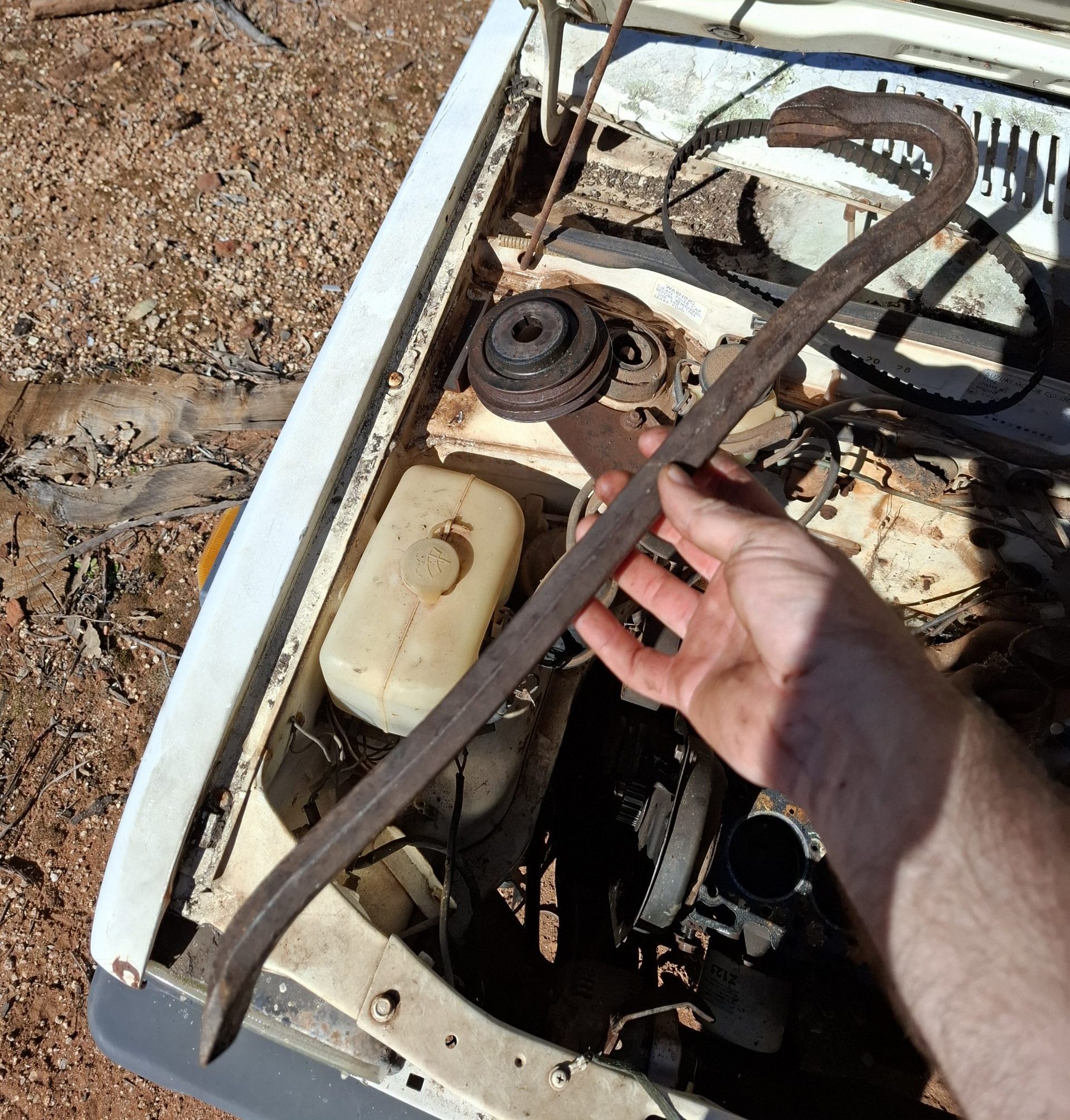
From this point I had spent enough time playing with these little Suzukis over a few weekends that it was pretty quick work to get the head off the red ute’s engine and get a new head gasket, headbolts torqued down and everything else transferred over.
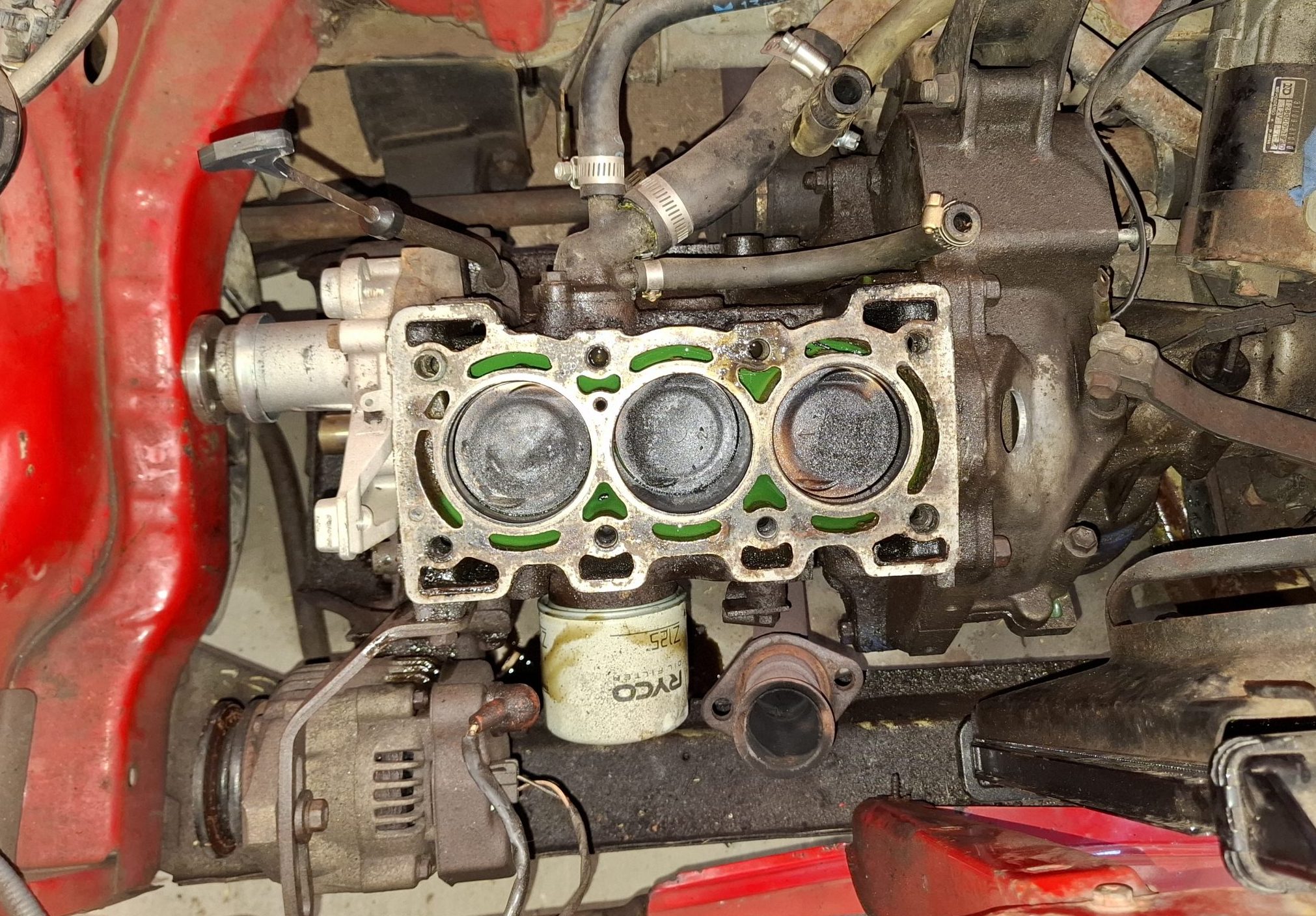
Incredulously, the workshop manual I had found online for the F5A engines was incorrect. I set the cam timing as per the manual, only to find that the engine would not rotate a full 360 degrees. I found a second timing mark on the camshaft sprocket and used that instead, and this worked with the engine rotating all the way around without issue.
Astro Boy
With the fuel, electrical and cooling systems also back together, it was time to fire it up:
Running on all three, that’s an improvement! There was no smoke coming out the tailpipe from the cold start either, an upgrade already!
After a bit of fiddling to get the engine sounding happier, I took it for a run and was absolutely astounded.
Bek had bought a JDM dash cluster and imported it a few years ago, and the tachometer had always indicated that the little F5A wouldn’t rev over about 5,500 rpm on a good day.
With the freshly-swapped cylinder head, that same tach was racing to 6,500rpm with urgency!
The result of this was that I was able to reach a genuine 100km/h – 62mph, on a slight incline!
The following day after some more ignition tuning I decided to make the feared highway run, and low and behold it managed to hit the desired 110km/h (70mph!
Sure, it took roughly a mile to get to that speed, luckily we have a protected lane to get up some pace. The steep hills to town that used to cruelly wipe off our velocity at a rapid rate were now scalable at a steady 95km/h (60mph).
That night Bek and I went out for dinner and took the little red hot-rod. Bek and I filmed the acceleration video above, plus the decadent velocity we could now attain as proof:
Sure, you wouldn’t drive it to Sydney (or race on Mooney Mooney Bridge link NFSW), but it was now much more usable that I can see the logbook getting filled up!
With such performance achieved, we will leave the F5A engine in this ute to keep it mechanically original and on the $150/year Historic Registration.
The parts ute however…
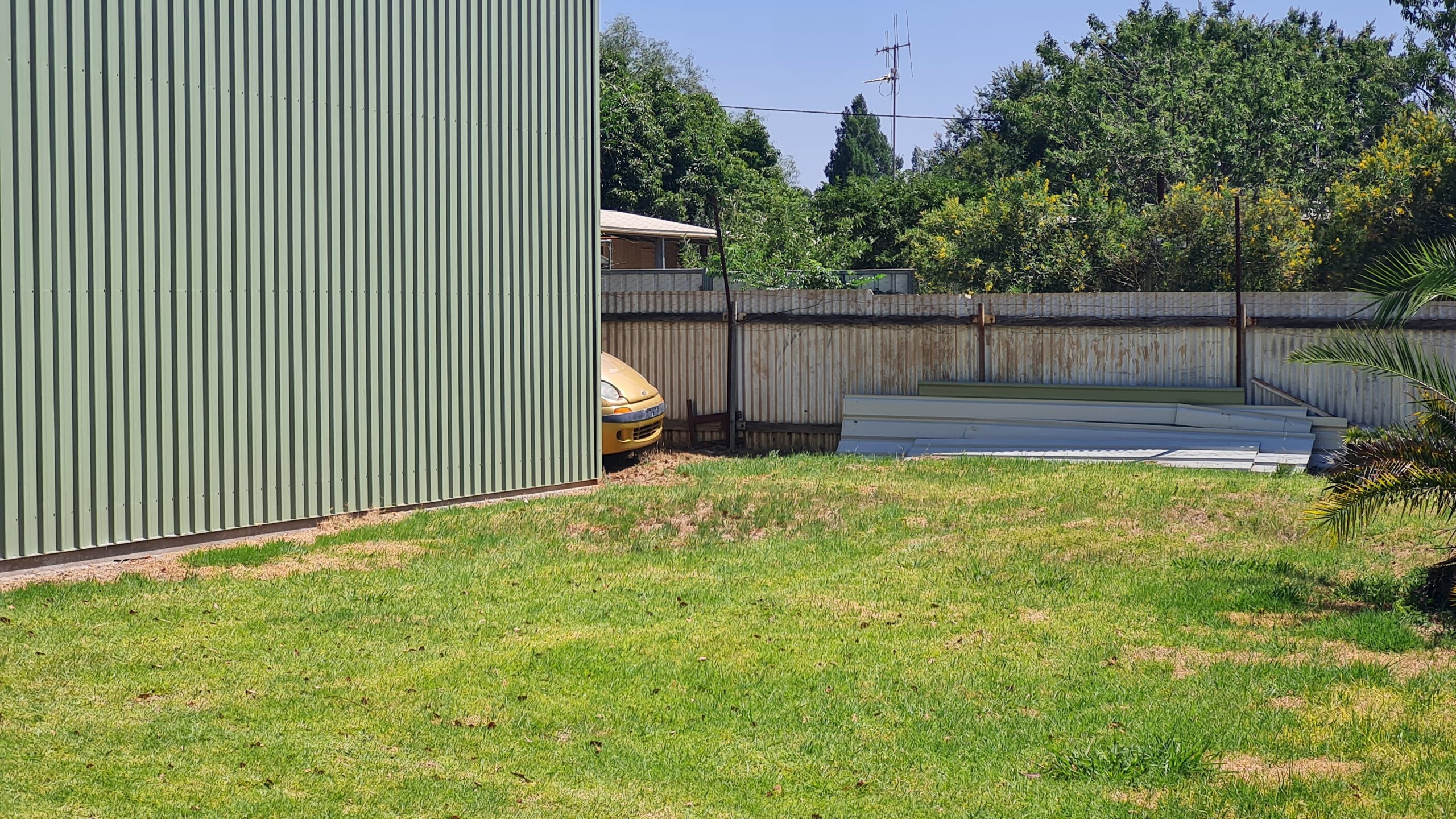
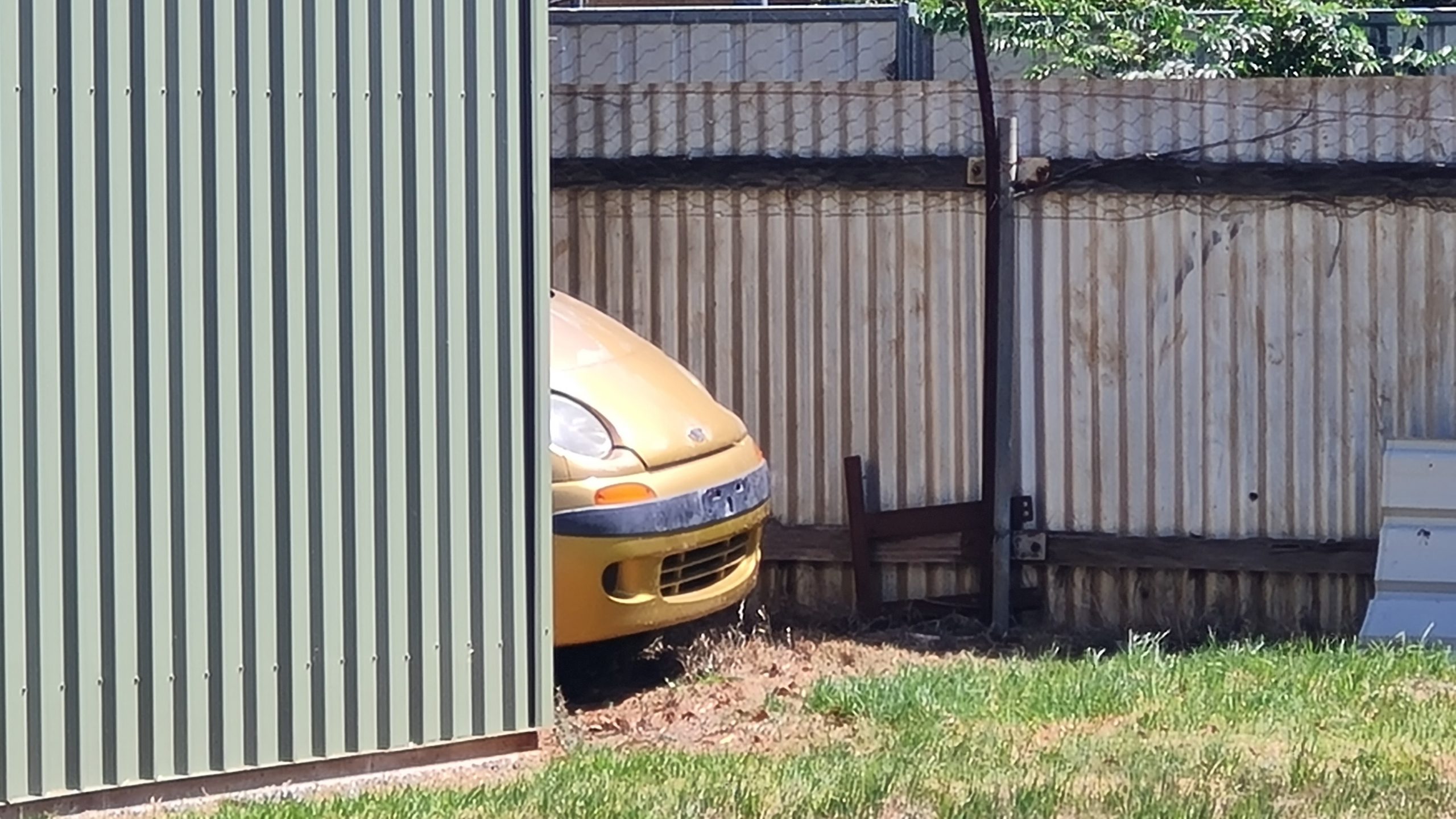
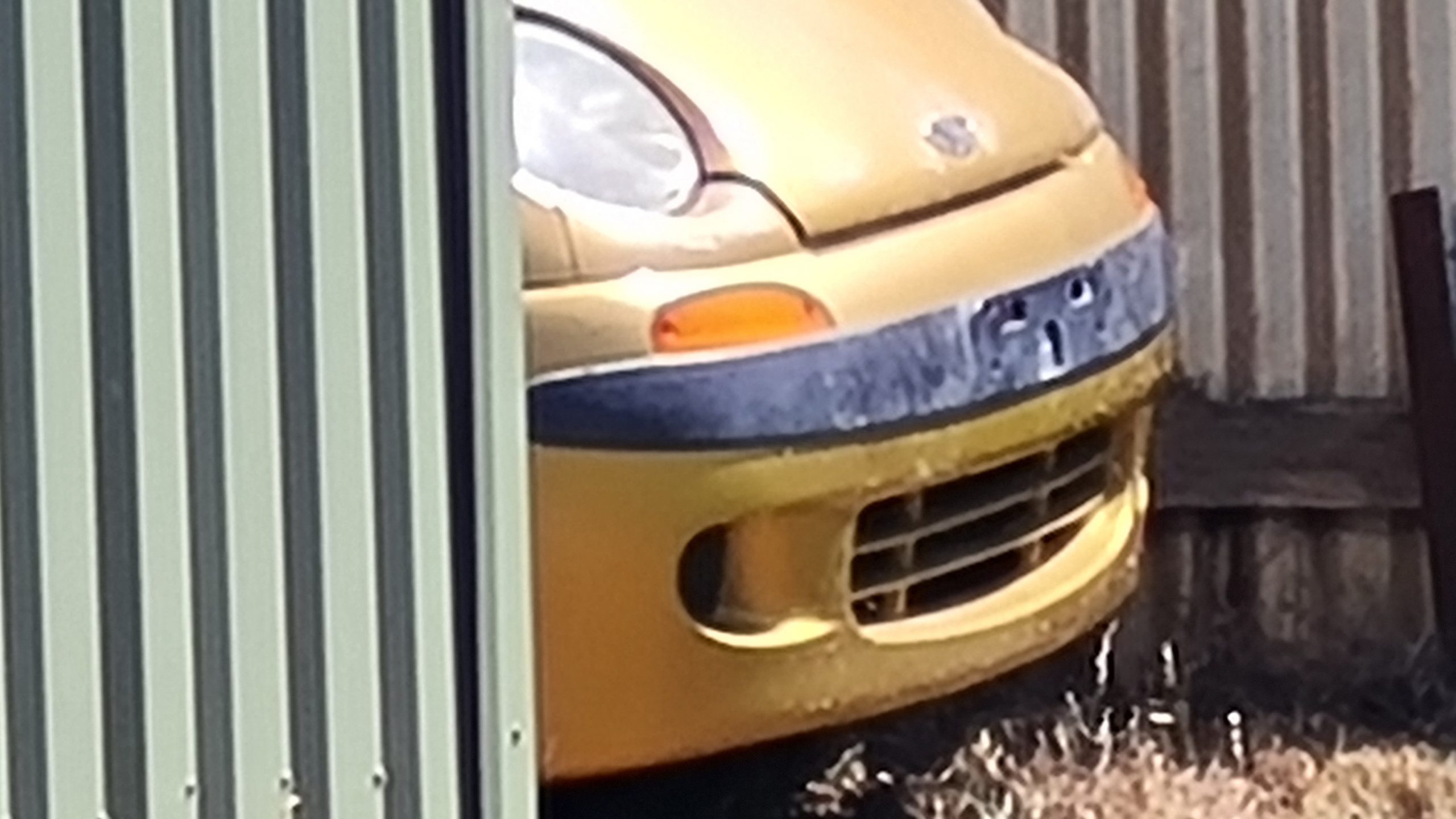 SOON….
SOON….

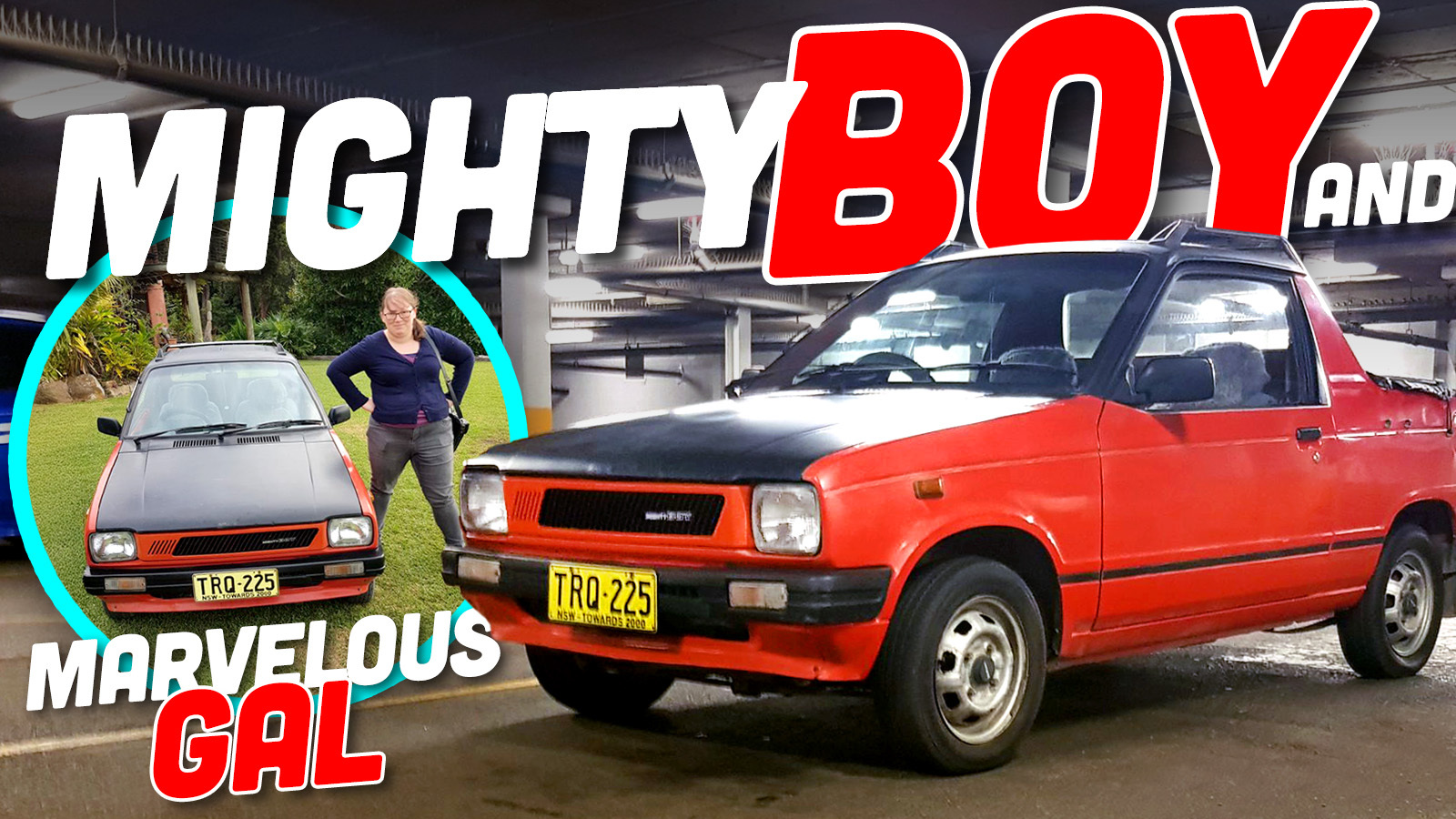





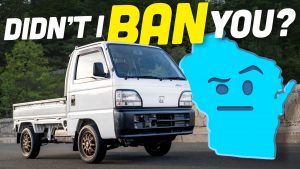
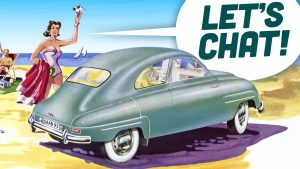
Awesome piece as always, mate! Bravo on some 1st-rate wrenching, my friend.
That’s a wicked strange, yet cool, little Suzuki!
Thanks SWG! Other than some stuff like the crank bolt and pulley being right next to the rail, it’s not too hard to work on and everything being small means they weren’t on with crazy clamping force!
Suzuki Mighty Boy…what a cute Ute!
Another great article Laurence!
Great work on this project
Thanks! Super fun little ute to drive, especially now it has an extra couple horses back in the stable!